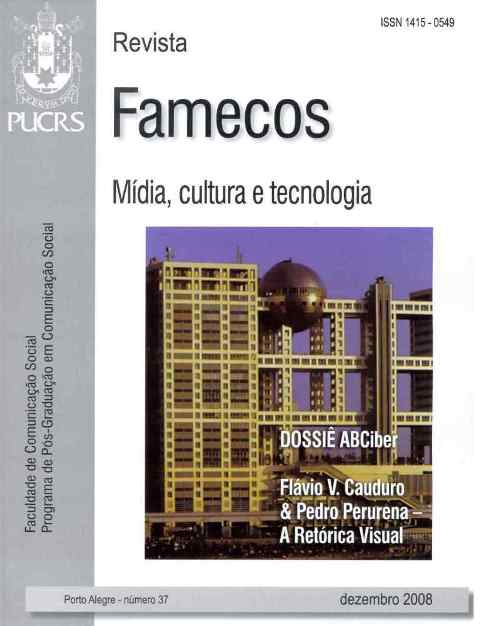Think Different : Estilos de Vida Digitais e a Cibercultura como Expressão Cultural
DOI:
https://doi.org/10.15448/1980-3729.2008.37.4794Palabras clave:
Cibercultura, formação cultural, iPhoneResumen
O conceito de cibercultura conquistou inquestionável direito de cidadania no campo das ciências humanas, onde tem se constituído como horizonte de questões relevantes para disciplinas tão diferentes como a antropologia, a filosofia ou a teoria literária. Contudo, sua amplitude e indefinição crônicas a aproximam da Comunicação, como um saber nebuloso, transdisciplinar e em constante reavaliação de suas fronteiras. O objetivo deste trabalho é propor uma definição operatória da Cibercultura como formação discursiva ou cultural (Cf. Matrix, 2006; Foster, 2005), com estruturas epistemológicas coerentes e passível de abordagem a partir de uma perspectiva unificadora.Descargas
Citas
CAMPBELL, Heidi (2007). "iPhone= Jesus Phone?!?". Online. Disponível em: http://religionmeetsnewmedia.blogspot.com/2007/08/iphone-jesus-phone.html Acesso em: 15 nov. 2007.
COYNE, Richard. Technoromanticism: Digital Narrative, Holism, and the Romance of the Real. Cambridge: MIT Press, 2001.
DAVIS, Erik. Techgnosis: Myth, Magic + Mysticism in the Age of Information. New York: Three Rivers Press, 1998.
FOSTER, Thomas. The Souls of Cyberfolk. Minneapolis: University of Minnesota Press, 2005.
FOUCAULT, Michel. Les Mots et les Choses. Paris: Gallimard, 1996.
GITELMAN, Lisa. Always Already New: Media, History and the Data of Culture. Cambridge: The MIT Press, 2006.
IMPERIALE, Alicia. "Digital Skins: The Architecture of Surface", em Lupton, Ellen. Skin: Surface, Substance + Deisgn. New York: Princeton Architectural Press, 2002.
JENKINS, Henry. Convergence Culture: Where Old and New Media Collide. New York: New York university Press, 2006.
______. Fans, Bloggers, and Gamers: Exploring Participatory Culture. New York: New York University Press, 2006.
LANDOW, George. Hipertext: The Convergence of Contemporary Critical Theory and Technology. Baltimore: Johns Hopkins University Press, 1992.
LATOUR, Bruno. Jamais Fomos Modernos: Ensaio de Antropologia Simétrica. Rio de Janeiro: Editora 34, 2000.
Le BRETON, David. L'Adieu au corps. Paris: Métailé, 1999.
LEMOS, André. Cibercultura: Tecnologia e Vida Social na Cultura Contemporânea. Porto Alegre: Sulina, 2002.
MARVIN, Carolyn. When Old Technologies were New. Oxford: Oxford University Press, 1988.
MATRIX, Sidney Eve. Cyberpop: Digital Lifestyles and Commodity Culture. New York: Routledge, 2006.
NYE, David. American Technological Sublime. Cambridge: The MIT Press, 1996.
RÜDIGER, Francisco. Elementos para a Crítica da Cibercultura. São Paulo: Hacker, 2002.
RUTSKY, R.L. High Techné: Art and Technology from the Machine Aesthetic to the Posthuman. Minneapolis: University of Minnesota Press, 1999.
SHAVIRO, Steven. Connected, or What it Means to Live in the Network Society. Minneapolis: University of Minnesota Press, 2003.
TOFTS, Darren & JONSON, Annemarie & CAVALLARO, Alessio (orgs.). Prefiguring Cyberculture: an Intellectual History. Cambridge: MIT Press, 2002.
TRIVINHO, Eugênio. A Dromocracia Cibercultural: Lógica da Vida humana na Civilização Mediática Avançada. São Paulo: Paulus, 2007.
TURKLE, Sherry. Life on the Screen. New York: Touchstone, 1997.






